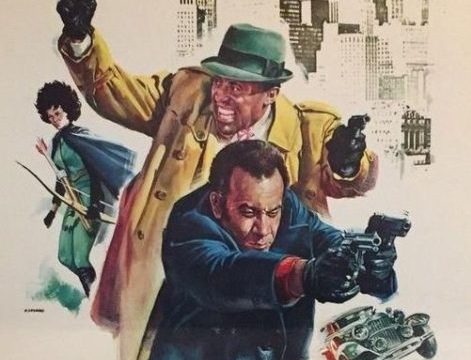Video store stashes previously known only to Chicago’s oddest cinephiles. The behind-the-scenes battles of music journalism. Rediscovered crime paperbacks. The conspiracies behind the world powers! An artist who seeks to unlock the secrets of darkness itself!
Thanks to Miller and Rosy Fingers for contributing, may your secrets stay buried. Send articles throughout the next week to ploughmanplods [at] gmail [dot] com and post your favorites from this past week for discussion below. Happy Friday!
First, correcting an omission: A comment yesterday about Everything’s Going to Be Okay by Conor Malcolm Crockford reminded me there was an article pulled for last Friday that somehow disappeared from the list. To compound the mistake, I discovered it was written by none other than our own Douglas Laman (aka NerdintheBasement). Enjoy it now! A look at the lack of autistic women in film, and the bold exception of the 2018 rom-com Keep the Change.
The character of Sarah also excels because both Israel’s writing and Elisofon’s performance aren’t afraid to make Sarah complex and messy. Sarah doesn’t fit into the “genius savant” stereotype Autistic movie characters are supposed to adhere to, nor does she embody the perfect romantic interest archetype women so often have to inhabit in romantic comedies. Instead, Sarah can mess up, say the wrong thing, be awkward, and not be demonized for it.
It was never a utopia, but I think more than a few of us saw the store even at its most farcical as playing some part in a struggle against dystopian forces. If you were going with your friends to see Miami Vice in the dingiest theater in Chicago, hooking up a video projector to show obscure films on the side of a garage, or just talking strangers into watching old B-movies, it was easy to imagine that your most abstract social and artistic values could be manifested in the physical world. You could pluck something you loved off a shelf, and in that sense it was a dream.
But as I watched it — the filmmakers reveling in this new information they’d discovered — I thought to myself, “Oh for fucks sake, I’ve heard this all before!” Except that documentary was called Hell’s Bells, and I saw it back when I was 16 at the private Christian school I attended… It was exactly the same narrative as this QAnon stuff, but instead of Hollywood, it was music. And instead of secret messages in Zoolander, it was back-masking in AC/DC songs.
Earworm gets published to YouTube and YouTube has an incredibly powerful control over the work that music educators are doing on the platform. Here’s an example: Every second of any song that I reference in an episode of Earworm is a risk. For the most part, I forge ahead and just make sure my commentary and storytelling is airtight. The problem is this: the YouTube’s content ID algorithm has no idea what fair use is—they demonetize and block uploads regardless of context.
The original Dell paperback version of Run Man Run was adorned with a picture of a seductive woman and cover copy that read, “Lush sex and stark violence, colored black and served up raw.” Himes was livid and wrote a letter to Dell executive Helen Honig Meyer proclaiming that the cover, “constitutes a false and derogatory commentary on my objectives and descriptive copy ignore the entire point and theme of my story.” In conclusion, Himes tossed a textual Molotov cocktail when he wrote, “If it is necessary to put this type of cover…on this book in order to sell it to the American people, the American people are really and truly sick.”
Now, working and sleeping in his blacked-out studio, he began to notice new things. Without sunlight as a guide, the day’s rhythms came via aural clues he had been only dimly aware of before: the cessation of London’s air traffic overnight, or the sound of idling vehicles as they took fractionally longer to move off from traffic lights during rush hour. When he brewed cups of rooibos in a rote-remembered action at his tea station he noticed that he could hear the difference between hot and cold liquids as he poured them.

